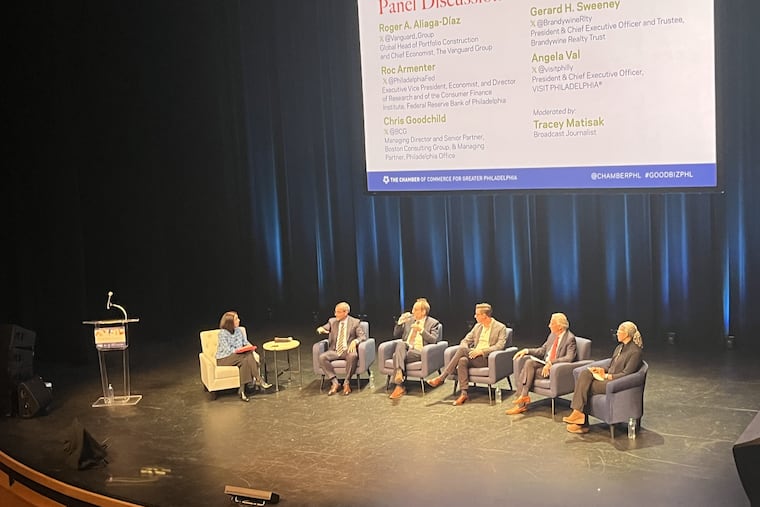A look at the challenges Philly-area businesses faced in 2024 and what they expect in 2025
The Chamber of Commerce of Greater Philadelphia released results of an annual report on Thursday with new insight on business expectations for the coming year.

Philadelphia-area business leaders’ biggest struggles in 2024 were poor sales, a challenging hiring market, and uncertainty about regulations and government policies, a new report from the Chamber of Commerce of Greater Philadelphia says.
For the State of the Economy report, the Federal Reserve Bank of Philadelphia surveyed 69 Chamber members between Nov. 7 and 25. Businesses were asked their feelings on business conditions and challenges in 2024 and what they expect in 2025.
Here’s a look at the results of the survey and where the region’s economy stands, according to business leaders.
Not expecting much change for the better this year
On the question of how their business activity fared in 2024 compared to 2023, companies’ responses were mixed, said Roc Armenter, the Federal Reserve Bank of Philadelphia’s executive vice president and director of research, who presented the survey results on Thursday at the Kimmel Center for the Performing Arts.
Some 36% of respondents noted an improvement in business conditions last year, while roughly 26% said conditions were the same, and 34.8% said business conditions were worse.
And the majority are not expecting things to look up in 2025, survey results showed. Nearly 60% of respondents expect to see the same or worse business conditions in the coming year. That’s a shift from 2022, when the majority of respondents expected the opposite: Around 72% anticipated improved conditions that year.
The Fed measures the share of respondents that expect business activity to increase in the coming year, minus those who expect a decrease. That number usually falls around 50, but this year was about 5, which Armenter said was “rather surprising.”
Only about a quarter of respondents said they’re looking to expand their workforce in 2025 — less than in the past. In the Chamber’s 2022 survey, 60% of respondents said they were looking to increase payroll in the coming year.
Still, Armenter noted, despite those intentions in 2022, not all businesses actually achieved the expansion they wanted to. In 2023 fewer firms were looking to expand payroll, and they were more successful at it, he noted. So, he said, perhaps it’s not too surprising that they’re less expectant of hiring this year.
“There are still difficulties to find workers,” Armenter said. ”We have a labor market that’s kind of balanced but has some shortages.”
Local companies plan to expand — but not much in Philly
A majority of business leaders — 42% — plan to expand physically in the coming year, yet only 14.5% plan to expand in the region.
One caveat Armenter pointed to is that the survey focuses on Chamber members who already have a presence in the area, “so if they grow, they’re more likely to grow elsewhere,” Armenter said.
“Instead, the growth in the city may come from businesses that come to town — but there’s still, I think, a substantial gap,” Armenter said.
The majority of survey respondents — nearly 64% — are looking to maintain their footprint in the Greater Philadelphia region, with almost 9% planning to shrink it in the coming year.
2026 could harness future growth
2026 is expected to be a big year for Philadelphia, as it will host FIFA World Cup games, the MLB All-Star Game, and the NCAA men’s basketball games, and mark the country’s semiquincentennial.
The World Cup games are expected to generate roughly 6,000 jobs locally and have a $770 million impact on the region, Angela Val, president and CEO of Visit Philadelphia, said at the event Thursday.
“What’s most important about these large events is that they’re only a starting point. They are not the finish point,” Val said Thursday. “The same intentionality that goes into bringing in the event must be in what happens once that event leaves and the money is left here with us.”
She pointed to Atlanta as an example of an area that has been able to use large events toward continued growth.
Since hosting the Olympics in 1996, the greater Atlanta region more than doubled its population, and improved its roads, highways, and public transportation. Olympics-related fundraising and revenue helped upgrade Atlanta’s airport, which has become the busiest in the country, and Centennial Olympic Park, built for the 1996 games, benefits the city with more green space. Atlanta is also host to many Fortune 500 companies, she noted. The city will also host World Cup Games in 2026 and has plans to complete part of its Beltline corridor development by that time.
“That is the type of intentionality that needs to go into the decisions to bid on these large events, but also what to do once they leave,” Val said.